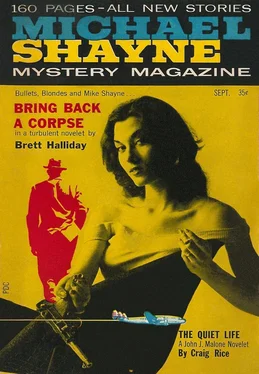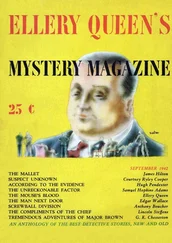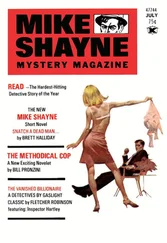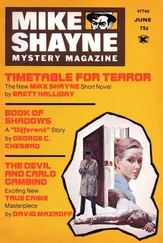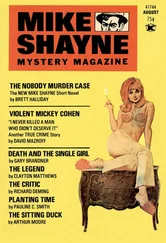Robert Bloch - Michael Shayne Mystery Magazine. Vol. 1, No. 1. September 1956
Здесь есть возможность читать онлайн «Robert Bloch - Michael Shayne Mystery Magazine. Vol. 1, No. 1. September 1956» весь текст электронной книги совершенно бесплатно (целиком полную версию без сокращений). В некоторых случаях можно слушать аудио, скачать через торрент в формате fb2 и присутствует краткое содержание. Город: New York, Год выпуска: 1956, Издательство: Renown Publications, Жанр: Детектив, на английском языке. Описание произведения, (предисловие) а так же отзывы посетителей доступны на портале библиотеки ЛибКат.
- Название:Michael Shayne Mystery Magazine. Vol. 1, No. 1. September 1956
- Автор:
- Издательство:Renown Publications
- Жанр:
- Год:1956
- Город:New York
- ISBN:нет данных
- Рейтинг книги:3 / 5. Голосов: 1
-
Избранное:Добавить в избранное
- Отзывы:
-
Ваша оценка:
- 60
- 1
- 2
- 3
- 4
- 5
Michael Shayne Mystery Magazine. Vol. 1, No. 1. September 1956: краткое содержание, описание и аннотация
Предлагаем к чтению аннотацию, описание, краткое содержание или предисловие (зависит от того, что написал сам автор книги «Michael Shayne Mystery Magazine. Vol. 1, No. 1. September 1956»). Если вы не нашли необходимую информацию о книге — напишите в комментариях, мы постараемся отыскать её.
Michael Shayne Mystery Magazine. Vol. 1, No. 1. September 1956 — читать онлайн бесплатно полную книгу (весь текст) целиком
Ниже представлен текст книги, разбитый по страницам. Система сохранения места последней прочитанной страницы, позволяет с удобством читать онлайн бесплатно книгу «Michael Shayne Mystery Magazine. Vol. 1, No. 1. September 1956», без необходимости каждый раз заново искать на чём Вы остановились. Поставьте закладку, и сможете в любой момент перейти на страницу, на которой закончили чтение.
Интервал:
Закладка:
“Richard? Don’t you want to look at it? Just to be sure before they install it and lay the cement?”
He realized that Marion had again been talking for some time, unnoticed. It irritated and vaguely frightened him that he was not observing his own precept to pay careful attention.
“Of course, dear.” He groped, but expertly. “Why, aren’t you satisfied?”
“Oh, I suppose the furnace people ought to know the best place for it. They must install hundreds of auxiliary fuel tanks. But if you’d just look, to make sure. Maybe you’ll think it ought to be somewhere else.”
He remembered now. It was a domestic trifle, an improvement in the heating system. He nodded, glanced at his wristwatch and stood up.
“I’ll do it right now. Then I’m afraid I’ve got to be going.”
“Do you have a lot of calls to make today, Richard?”
“Lots,” he said, cheerfully, and proceeded to overwhelm wife number three with a torrent of details. “Elite, Paragon, Acme, three or four Eat-Rites, two Welcome Inns. That’s just between here and Trenton. I hope I’ll reach there by evening. But with the list of restaurants I’ve got to see — about twenty-five to thirty a day — I’m not sure just where I’ll be tonight. Or, for that matter, in the next ten or twelve days. Eleven days, to be exact,” he added thoughtfully. “Now, let’s see the tank.”
On the way to the basement, Richard collected his hat, overcoat and suitcase. He set the suitcase down in the kitchen, then followed Marion through the door that led downward. At least, he went two-thirds of the way down the wooden steps, intending, from that barest possible display of interest, to give full approval to her arrangements.
Standing on the lower part of the stairway, he could see most of Marion’s basement. This basement belonged to Marion, because all of its appointments were hers, whereas the Hartford basement had a bar, which made it both his and Lucille’s. Besides the assorted laundry machines, and the door of the small partition that formed Marion’s photographic dark-room — her one hobby — he saw that a slit-trench affair had been drilled through the cement floor and dug out of the dank earth beneath. Beside it stood the new tank, not yet lowered into place, and a bulky, unopened sack of some ready-mixed cement.
Richard had now seen enough to give either his approval or criticism, if any, with suggestions. He still inclined toward approval, as easier and quicker.
“It looks all right to me,” he said.
Marion peered up at him, anxious and pathetically helpless. “Are you sure?” she asked.
Richard’s reply was a little short. As a matter of fact, there was a hazy something he did not like at all, seeing Marion like that, innocent and greying, a little too trusting, standing beside that gaping hole.
“Quite sure. It’s just where I would have—” He broke off, acutely disturbed by the phrase he seemed to be using, and without knowing why. He changed it to, “It couldn’t be better if I’d chosen the place, myself.”
He turned quickly and went back up the stairs, with Marion following. Somebody, Richard darkly felt, was being in rather poor taste. But who? That mound of loose dirt, and the bag of cement besides. There was something about the scene that was not only vulgar, but oppressive.
He had placed his suitcase down beside the kitchen’s outside door when Marion reappeared. She smiled brightly, but his spirits did not lift. Unaccountably, he had another obscure association of ideas. For some reason — for no logical reason — his mind turned to a certain crude, lurid, seamier side that less successful members of his calling undeniably used, to the shadowy half-world of Lonely Hearts clubs, matrimonial bureaus, and throbbing exchanges. Let there be a particularly messy explosion in the realm of matrimony, and the odds were even that one of those Lonely Heart clubmen, or clubwomen, was in back of it.
Richard held such strong views against agencies of this type that he couldn’t abide mention of them, not even in jocular vein. It was one of few subjects upon which he had, at one time or another, quarreled with several of his wives. With all of them, in fact. About divorce, too, he was quite strict. It could easily undermine his career.
“Have you got your sample case, Richard?” Marion asked.
“It’s in the trunk of the car,” he told her. “I’ve got everything. You don’t need to come out.”
“Well...?”
“This is the fifth,” he reminded her. “I’ll be back for dinner on the evening of the sixteenth. Meanwhile, I’ll phone you from time to time and, if anything comes up, you can reach me through the New York answering service.”
“All right, Richard. Have a good trip.”
“Thank you, dear. Take care of yourself and, above all, don’t worry that beautiful head of yours about trifles. Just relax. Let me do all the worrying.”
They kissed, warmly. Then he picked up his suitcase and went down the driveway to the garage. It was a fact, he reflected, that all the worrying was left to him. Marion probably did not appreciate just how much worry there was.
Neither did Bernice, nor Lucille, nor Helen — none of them. But, under the circumstances, he couldn’t ask, he couldn’t even hint, at the credit he really deserved for the many detailed responsibilities he bore.
However, these added cares were not too heavy — they were hazards of his career. Backing his coupe down the driveway, Richard’s moodiness was already gone. In front of the house, he looked up and waved to Marion, now standing in the open doorway, her striking figure undimmed by a simple house-dress. She waved affectionately in return.
His was a full, engrossing life, he decided as he drove along. Some people might even think it fascinating, if not too much so, imagining it filled with dreadful risks. There was a small element of danger, of course. But this only added zest. It offered the faint, tang-laden pinch of adventure, without which, really, his regulated life would be unbearably placid. It was long since far too-well rehearsed.
II
Three hours later, shortly before noon, Richard C. Brown passed temporarily out of existence.
The loss of identity required less than a minute. It took place in a busy railroad checkroom in Philadelphia. It required only the time to check in his salesman’s sample-case and order-book — Speedie Sandwich Co., Automatic Cutters, Precision Knives. Then, all that was needed was to take out a similar sample-case and order-book for his next incarnation, as a salesman of cosmetic novelties.
He had entered the checkroom in the name of Richard C. Brown. Under that name, he had actually made three lackadaisical stops at three widely separated restaurants that morning. At one of them, he had actually been forced to make a sale, as his order-book showed.
When he came out of the checkroom, he was Robert D. Brown. In that identity, he would make two or three torpid calls at drugstores during the afternoon, plus a few more during the next three days. That was part of the schedule — the most tiresome part, of course. It was a waste of time. But it was time indispensably given up, he felt, to protect his best interests in so many roles.
The business concerns for which he sold — or, at any rate, with whose products he traveled — were small and specialized. No high-pressure salesmen competed for their exclusive territorial rights. The owners of these companies might wonder what type of paralysis afflicted the slow-motion Brown, but, from their standpoint, paying him only on a commission basis, even a few sales were better than none.
As for Mr. Brown, he had other fish to fry. Far more important matters demanded his time and intelligence.
Читать дальшеИнтервал:
Закладка:
Похожие книги на «Michael Shayne Mystery Magazine. Vol. 1, No. 1. September 1956»
Представляем Вашему вниманию похожие книги на «Michael Shayne Mystery Magazine. Vol. 1, No. 1. September 1956» списком для выбора. Мы отобрали схожую по названию и смыслу литературу в надежде предоставить читателям больше вариантов отыскать новые, интересные, ещё непрочитанные произведения.
Обсуждение, отзывы о книге «Michael Shayne Mystery Magazine. Vol. 1, No. 1. September 1956» и просто собственные мнения читателей. Оставьте ваши комментарии, напишите, что Вы думаете о произведении, его смысле или главных героях. Укажите что конкретно понравилось, а что нет, и почему Вы так считаете.
